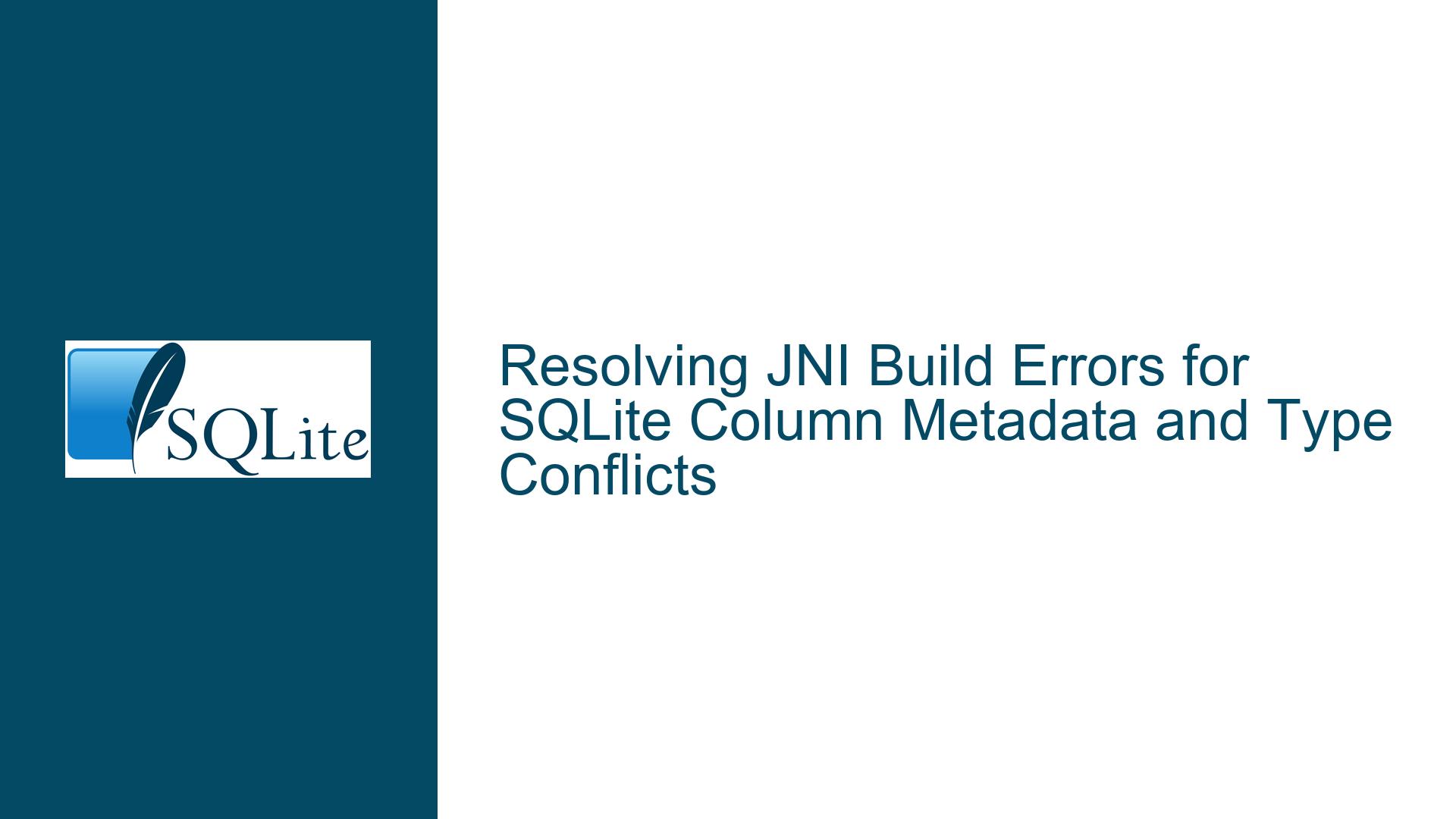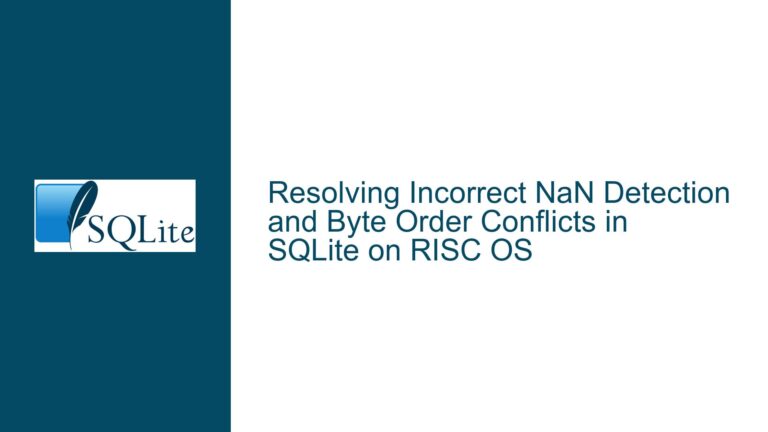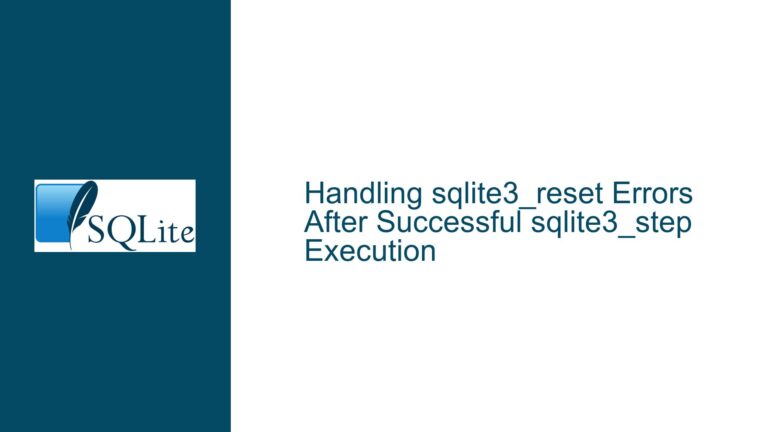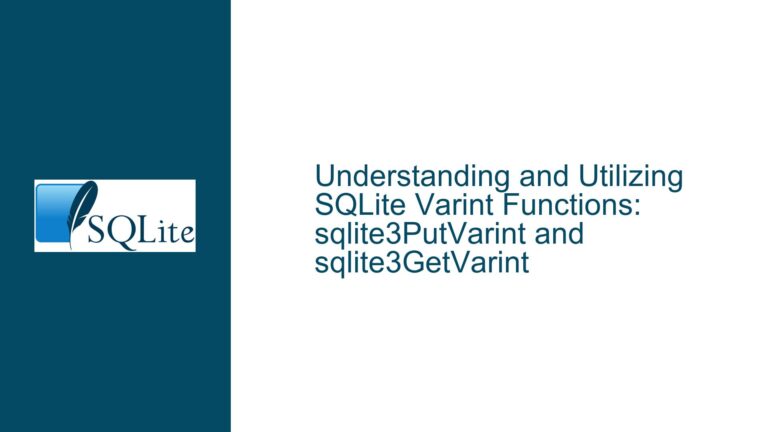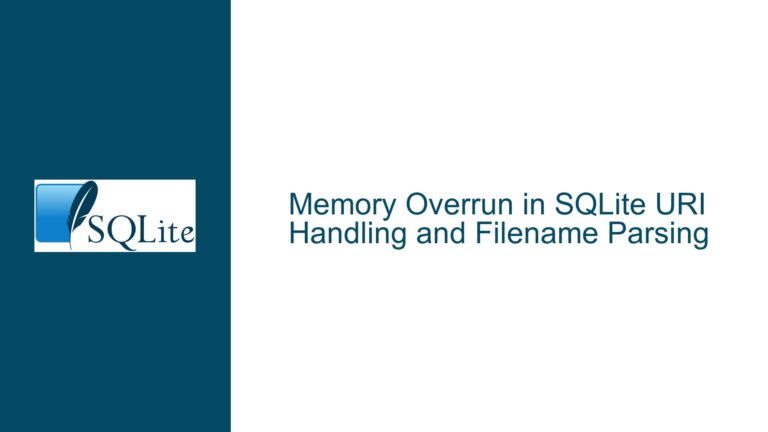Resolving JNI Build Errors for SQLite Column Metadata and Type Conflicts
Undefined Symbols and JNI Type Mismatches During SQLite JNI Compilation
Issue Overview: Missing SQLite Column Metadata Symbols and JNI Function Signature Conflicts
The primary issue encountered during the SQLite JNI (Java Native Interface) build process manifests in two distinct phases across different platforms:
Undefined Symbols for
sqlite3_column_*_nameFunctions on macOS
When compiling the JNI extension (ext/jni), the linker reports missing symbols for the functions:sqlite3_column_database_namesqlite3_column_table_namesqlite3_column_origin_name
These functions are part of SQLite’s Column Metadata API, which is conditionally compiled into the library only when the
SQLITE_ENABLE_COLUMN_METADATApreprocessor flag is defined. The build process initially fails because this flag is not propagated to the JNI component’s compilation phase, leading to linker errors.JNI Function Signature Mismatches on Windows/MinGW
After resolving the missing symbols, a secondary issue arises when compiling the JNI code under Windows using MinGW. The compiler reports type conflicts betweenjint(Java’s 32-bit integer type, mapped tolong intin MinGW) and the Cinttype (32-bit). Examples include:Java_org_sqlite_jni_capi_CApi_sqlite3_1complete: Declared asintin C code but expectsjint(long int) in JNI headers.Java_org_sqlite_jni_fts5_Fts5ExtensionApi_xSetAuxdata: Return type mismatch betweenintandjint.
These discrepancies violate JNI’s strict type compatibility rules, causing compilation failures. Additionally, strict compiler settings in MinGW expose inconsistencies in
constqualifiers forJNIEnv*pointers and parameter ordering in JNI function declarations.
Root Causes: Build Configuration and Platform-Specific JNI Type Handling
1. Incomplete Propagation of SQLITE_ENABLE_COLUMN_METADATA to JNI Build
The SQLite JNI extension’s build process is governed by its own GNUmakefile, which initially did not include the -DSQLITE_ENABLE_COLUMN_METADATA flag. This omission occurs because:
- The
CFLAGSenvironment variable or./configurearguments do not automatically propagate to subcomponents likeext/jni. - The JNI extension’s
GNUmakefileexplicitly defines its own set of SQLite compilation flags (SQLITE_OPT), excludingSQLITE_ENABLE_COLUMN_METADATA.
Consequently, the Column Metadata API functions are not compiled into the JNI shared library, leading to linker errors when Java code references them.
2. Platform-Specific JNI Type Mismatches and Compiler Strictness
The JNI type conflicts stem from two interrelated factors:
- JNI Type Mappings: On Windows/MinGW,
jintis defined as along int(32-bit), whereas on Unix-like systems,jintmaps directly toint. The JNI code incorrectly assumesjintandintare interchangeable across all platforms. - Compiler Sensitivity to
constand Parameter Types:- The
JNIEnv*pointer is declared asJNIEnv* constin function signatures, introducing a redundantconstqualifier that MinGW treats as a type mismatch. - Function declarations in
sqlite3-jni.h(generated by Java’sjavac -h) usejint, while the implementation insqlite3-jni.cusesint, violating JNI’s strict type requirements.
- The
These issues are exacerbated by MinGW’s strict adherence to C99 standards, which prohibits implicit type conversions between int and long int, even if they are the same size.
3. Inconsistent Dynamic Library Naming on macOS
The JNI build script generates a shared library with a .so extension on macOS, which conflicts with the platform’s convention of using .dylib. While this does not prevent compilation, it causes runtime errors when Java attempts to load the library using System.loadLibrary(), which expects platform-appropriate extensions.
Resolving Build Errors: Configuration Adjustments and Cross-Platform Code Fixes
Step 1: Enable SQLITE_ENABLE_COLUMN_METADATA in JNI Build
Modify the JNI extension’s GNUmakefile to include the missing flag:
# In ext/jni/GNUmakefile, add SQLITE_ENABLE_COLUMN_METADATA to SQLITE_OPT
SQLITE_OPT += \
-DSQLITE_ENABLE_COLUMN_METADATA \
... (existing flags)
This ensures the Column Metadata API is compiled into the JNI library. After applying this change, clean the build (make clean) and recompile.
Step 2: Align JNI Function Signatures Across Platforms
Address type mismatches by standardizing JNI function declarations:
A. Use jint Instead of int for JNI Functions
Update all JNI functions returning integers to use jint instead of int:
// Before
JNIEXPORT int JNICALL Java_org_sqlite_jni_capi_CApi_sqlite3_1complete(...);
// After
JNIEXPORT jint JNICALL Java_org_sqlite_jni_capi_CApi_sqlite3_1complete(...);
B. Remove Redundant const Qualifiers from JNIEnv*
In sqlite3-jni.c, revise the JniArgsEnvObj and JniArgsEnvClass macros:
// Before
#define JniArgsEnvObj JNIEnv * const env, jobject jSelf
// After
#define JniArgsEnvObj JNIEnv * env, jobject jSelf
This eliminates spurious const mismatches in MinGW.
Step 3: Correct Dynamic Library Naming on macOS
Adjust the build script to generate .dylib on macOS instead of .so:
# In ext/jni/GNUmakefile, conditionally set library extension
UNAME_S := $(shell uname -s)
ifeq ($(UNAME_S), Darwin)
LIB_EXT = .dylib
else
LIB_EXT = .so
endif
# Update build target
bld/libsqlite3-jni$(LIB_EXT): $(JNI_SRCS)
$(CC) ... -o $@ ...
Alternatively, manually rename the output file after compilation:
mv bld/libsqlite3-jni.so bld/libsqlite3-jni.dylib
Step 4: Fix Encoding and Resource Leaks in Java Bindings
A. Force UTF-8 Encoding in Java Compilation
Prevent encoding-related errors in MinGW by explicitly setting the source encoding:
# In GNUmakefile, add -encoding utf8 to javac.flags
javac.flags ?= -Xlint:unchecked -Xlint:deprecation -encoding utf8
B. Close sqlite3_blob Handles on SQLITE_MISUSE
Modify the Java wrapper to handle sqlite3_blob_close() correctly when SQLITE_MISUSE occurs:
// In SqliteBlob.java, ensure blob is closed even on misuse
try {
int rc = CApi.sqlite3_blob_open(...);
if (rc != CApi.SQLITE_OK) {
if (rc == CApi.SQLITE_MISUSE) {
CApi.sqlite3_blob_close(out.getValue());
}
throw new SqliteException(rc, ...);
}
} finally {
// Cleanup logic
}
Step 5: Validate Zero-Length BLOBs and Column Count Caching
A. Distinguish NULL vs. Zero-Length BLOBs
Correct the JNI code to differentiate between SQL NULL and zero-length BLOBs by checking sqlite3_column_type():
// In sqlite3-jni.c, update blob handling
int type = sqlite3_column_type(pStmt, ndx);
if (type == SQLITE_NULL) {
return NULL; // Java null for SQL NULL
} else {
const void *p = sqlite3_column_blob(pStmt, ndx);
int n = sqlite3_column_bytes(pStmt, ndx);
return s3jni_new_jbyteArray(p, n); // Zero-length array if n==0
}
B. Refresh Column Count After Schema Changes
Avoid caching sqlite3_column_count() in high-level wrappers to prevent stale metadata after ALTER TABLE:
// In SqliteStatement.java, fetch column count dynamically
public int getColumnCount() {
return CApi.sqlite3_column_count(nativeStmtHandle);
}
Conclusion
The JNI build errors arise from incomplete flag propagation and platform-specific disparities in JNI type handling. By explicitly enabling SQLITE_ENABLE_COLUMN_METADATA, standardizing JNI function signatures, and addressing macOS/Windows idiosyncrasies, the compilation succeeds across platforms. Developers should also ensure Java-side wrappers handle SQLite’s C API nuances, such as BLOB distinctions and dynamic column counts. For ongoing updates, refer to SQLite’s trunk revisions, which incorporate these fixes.
